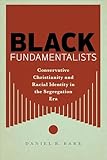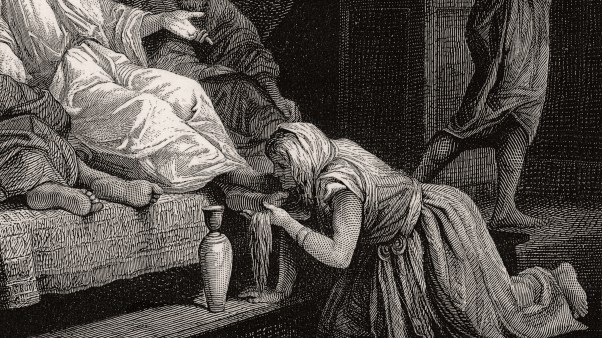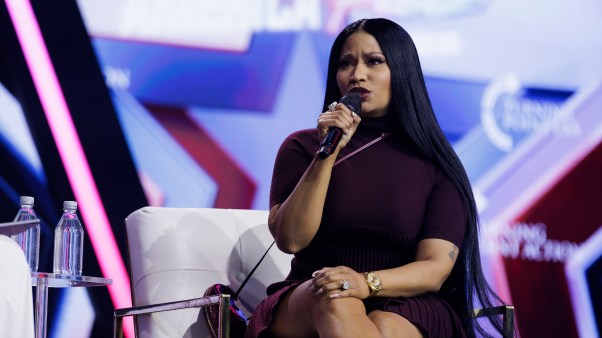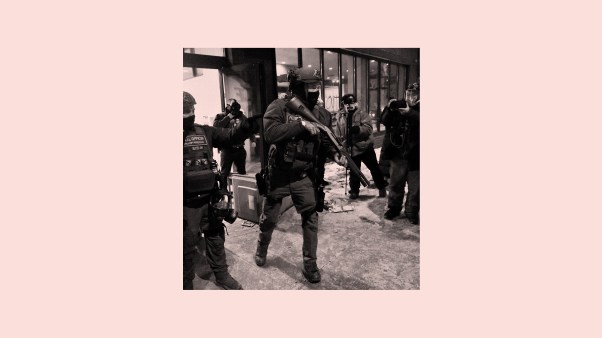Seventy-four years ago, Carl F. H. Henry, the first editor of Christianity Today, produced his watershed volume The Uneasy Conscience of Modern Fundamentalism. This work represented Henry’s clarion call for evangelicals to engage with the social ills facing the world, to apply the fundamental doctrines of the Christian faith to address the needs of society without being trapped into preaching a mere “social gospel.” Fundamentalists of the prior generation, he argued, showed a troubling “reluctance to come to grips with social evils” as they isolated themselves from the surrounding world.
Listed with “aggressive warfare,” “the liquor traffic,” “exploitation of labor or management,” and other social sins that Henry identified as too removed from fundamentalist rhetoric and conscience was, notably, “racial hatred and intolerance.” And this was, by and large, an accurate assessment, at least among those whom Henry here envisioned as “fundamentalists”—a category essentially white in its composition.
This assumption was not only shared by Henry and his contemporaries but by historians looking back on the era. Yet while the conscience of Henry’s fundamentalists might have been uneasy under the weight of social isolation, there is another fundamentalist conscience of this era that has long been obscured. The self-conscious presence of Black fundamentalists on the early-20th century American religious landscape both interrupts the common historical narrative and, perhaps, might prompt today’s evangelical heirs of the fundamentalist movement to reflect on their theological heritage.
The theological thrust behind fundamentalism during much of the 1900s was, at its most basic, an unwavering opposition to the theological alterations and innovations being advanced under the day’s “modernist” or “liberal” theology.
Believing that modernists’ embrace of ideas like higher biblical criticism and evolutionary theory constituted an abandonment of historic Christian faith, fundamentalists emphasized what they saw as the “fundamental” doctrines of the age-old faith. On its face, there seems to be no reason that such theological concerns ought to be racially delimited, yet African Americans remained excluded from the story of fundamentalism.
This is changing. For example, Mary Beth Swetnam Mathews’s excellent 2017 book, Doctrine and Race, has deservingly received a great deal of attention as it examined fundamentalism’s relationship to the color line.
Still, even Mathews treats fundamentalism as a phenomenon wholly external to the Black Protestant community: “The movement’s leaders had so racially coded fundamentalism as the purest form of Christianity that their racial inclinations could not allow African Americans the ability to confess it for themselves.”
But many African Americans did confess it for themselves, arguing both for the theological ideas of fundamentalism, like the supernatural authorship of Scripture, and for the term itself. As an editorial in the Norfolk Journal and Guide, one of America’s leading Black newspapers, proudly asserted in the buildup to the famous 1925 Scopes Trial over teaching evolution: “The Afro-American people are Fundamentalists, for the most part.”
Why, then, have Black fundamentalists been ignored or marginalized—intentionally or accidentally—not only by their contemporary white counterparts, but also by historians looking back on the era?
One reason is Black and white fundamentalists shared theological convictions and shared a belief that those convictions meant fighting sin and worldliness in the political and social spheres, but they differed on which social sins deserved attention.
Early white fundamentalists spent their energy primarily fighting cultural battles over issues like the inclusion of evolutionary theory in public school curricula, while generally accepting (or at times promoting) the racial status quo of their day. The theological conservatism of Black fundamentalists, by contrast, undergirded calls for racial advancement and equality.
While many leading Black voices of the early 20th century—men like W. E. B. Du Bois and Langston Hughes—adopted and adapted elements of Walter Rauschenbusch’s emerging social gospel theology to address the racism facing the African American community in the Jim Crow era, others chafed at the idea of abandoning the old-time, fundamental Christianity that had so long sustained the Black community. Many church leaders argued that the advancement of the Black community was tied to its faithfulness to the historic Christian faith.
That Norfolk Journal and Guide editorial, for example, continues by arguing that fundamentalist faith “has brought [the race] thus far, and the belief is general that it is sufficient to carry us further in the enlargement of higher and better things in human life and living. … Yes, the Afro-American people are Fundamentalists, and they can give a reason for the faith that is in them by pointing to what they have become in this free Nation from what they began in the days of the Colonies.”
A similar endorsement of fundamentalism came from J. G. Robinson, longtime editor of the African Methodist Episcopal Church’s newspaper, the A.M.E. Church Review. Robinson took over editorship of the paper in 1924, representing a sharp contrast to his more social gospel–friendly predecessor, Reverdy Ransom.
Robinson’s theological conservatism shone through during his editorial tenure for the better part of the next two decades, and was particularly obvious in an article that he penned in 1936 for the A.M.E. Zion newspaper, The Star of Zion. Robinson warned that the pressing threat of modernist theology in Black churches was “contrary to the universal belief of the Christian church.” Modernism was a blight on the church due to its assumption of “the errancy of the Holy Scriptures,” which led modernists to summarily dismiss “many of the doctrines which were believed to be necessary for salvation”—doctrines like Christ’s virgin birth, his deity, and his literal resurrection. In contrast to the dangerous infidelity of the modernists, Robinson hailed the upright example of “the old line preachers (of which I am one) called ‘Fundamentalists’ … who unequivocally hold on to the inerrancy of God’s Word as it is set down in the Holy Bible from Genesis to Revelation.”
Robinson likewise distinguished between the gospel messages that modernists and fundamentalists preached. He exhorted pastors to “hold tenaciously to the apostolic interpretation of the Word of God,” preaching a “Gospel of conviction, Conversion, Regeneration and Sanctification.” Modernism, by contrast, offered a “Gospel of social service and economic security,” which represented both a betrayal of the historic Christian faith and a corrosive threat to the spiritual well-being of the Black community. In fact, he declared, the modernists’ social gospel message had “well nigh taken all the comfort and sweetness out of the lives of the people and almost emptied the churches.”
As a man who believed that the faith and character of the community’s ministers were among “the greatest factors in the elevation” of the race, Robinson lamented that social-gospel preaching threatened to undermine the religious truths that had for so long bolstered the Black community in their struggle for freedom. To remain true to their own heritage, then, African American churches needed to “leave off much social philosophy and sociology, and give us the pure unadulterated Gospel of Jesus Christ.”
Robinson’s category of “old line preachers” would certainly have included his contemporary Isaac Reed Berry, whose pulpit ministry similarly illustrated constellations of fundamentalist doctrine, anti-modernist condemnations, and racial applications.
Hailing originally from Fodice, Texas, Berry had migrated eastward in his early 20s in pursuit of higher education, training first at Howard University and then as one of the few Black students at the Boston University School of Theology. Ordained a Methodist minister in 1917 and pastoring numerous churches across the upper South, Berry made no secret of his fondness for fundamentalist exemplars like Billy Sunday or, in turn, his abiding hostility and disdain for the program of modernist theology.
A particularly common target of Berry’s polemical ire from the pulpit was the practice of higher biblical criticism. He derided the modernist view of the Bible as, among other things, a satanic deception, an expression of hatred toward God, a fire of infidelity, and an unabashed wickedness in the Lord’s sight. Yet even in the face of such ungodliness, he assured his congregants, the “inspired” and “imperishable” Scriptures would unfailingly prevail.
As with white fundamentalists, the doctrinal considerations of Black fundamentalists did not stand isolated from the circumstances of the surrounding world. In one sermon, Berry conjoined biblical criticism with “bigotry” as societal forces that aimed to “keep the Bible from doing its blessed work in the world.” In doing so, he positioned the doctrine of biblical inerrancy as a firm pillar to uphold African Americans’ claims to social equality. In his preaching, Berry repeatedly invoked texts like Acts 17:26 (“[He] made of one blood all nations of men”; KJV throughout) and Psalm 133:1 (“Behold, how good and pleasant it is for brethren to dwell together in unity!”) as divine rebukes of the Jim Crow racial hierarchy, words from God himself underscoring the full humanity and equality of Black people.
Berry argued, for instance, that the Athenians in Acts 17 “considered themselves a super race, a unique race, and all other races were just a little lower, for they were made out of a little lower dust,” evoking an unmistakable parallel with the Jim Crow racial theories of Berry’s day. Paul’s message of divine creation in Acts 17:26 thus undergirded Berry’s claim to full social and racial equality, affirming that “every man on earth is my brother, no supermen, no super race, we are one in nature and we all need to be saved from sin.”
Yet modernist higher critics sought to undermine the authoritative nature of these texts by casting doubt on the Bible’s standing as God’s Word. For Berry, the stakes here were high: After all, if God did not specially create humanity in his own image, as the Bible taught, and if the Bible itself did not represent God’s trustworthy revelation to mankind, then Christian rebukes of Jim Crow had no firm foundation but rather rested atop pillars of sand.
Berry also used other fundamentalist doctrines to challenge the racial status quo in ways that his white counterparts typically would not, despite their theological alignment. He began and ended one sermon on the equality of mankind with a focus on Jesus’ substitutionary atonement. His application: Legalize interracial marriage.
“When wedlock is unrestricted except by moral law, individual taste and pleasure,” he enjoined, “the heart of the races will beat as one. When this is accomplished, one race will cease lauding it over and domineering any other race and the race antagonism will melt away like a frost on a bright spring morning before the glare of the rising sun.”
Christ’s sacrifice for all mankind demonstrated that people of all races stood on equal footing before God, Berry repeatedly argued. Thus societal racism was an affront to Jesus’ work. In other sermons, he grounded the doctrine of Christian unity in the objective atoning power of Christ’s shed blood, offering applications that highlighted the racial prejudice of his day. Whereas the unity of the church on the basis of Christians’ common redemption in Christ’s blood ought to pertain equally “on earth and in heaven,” tragically this was not the case. Christ’s second coming would establish a kingdom with “no class spirit,” “no prejudice,” “no racial discrimination,” and “no envy, jealousy, and selfishness.” Meanwhile, white Christians tolerated the “destruction of homes, and disfranchisement and discriminations in most subtle, cruel, and hideous forms [that] the Negro suffers today.”
As he was quick to point out, the ideals of Christian unity and Christians’ common blood-bought redemption demanded an end to such “cruel and hideous” treatment of any racial group. For Berry, then, there was no need for “a new theology, a new salvation, [or] a new redeemer,” for the old-time doctrines that the modernists had rejected constituted the basis of his calls for racial equality and fraternity.
Even as certain Black Protestants embraced the fundamentalist mantle, they remained marginalized with respect to the institutional structures of the fundamentalist movement. Their racial identity led to a degree of isolation, as both their contemporary white counterparts and later historians tended to overlook them. Over time, identifications like fundamentalist began to wane as theologically conservative white Christians like Carl Henry and Billy Graham shifted to identifiers like evangelical and Bible-believing.
While theologically conservative African Americans continued to affirm the same essential doctrines as their now-evangelical white peers, the tensions begotten of longstanding racial inequality remained. Some Black pastors continued to express concerns about the social gospel (even as they preached social and political implications in the gospel message). Others saw common cause with predominantly white evangelical institutions and leaders while focusing on their own congregations and institutions. And other Black leaders sought greater distance from both evangelical labels and predominantly white evangelical networks even as they remained centrally concerned with the theological truths that define the evangel (Good News)—the universality of human sin; the authority and trustworthiness of Scripture; the reality of the Incarnation; the salvific and atoning work of Christ in his life, death, and resurrection; and so on.
While the story of Black fundamentalism represents an important piece of history that has fallen through the cracks, it offers more than just an interesting historical anecdote. It is a demonstration of the breadth and depth of conservative Protestant heritage that goes too often unnoticed, both inside and outside those Christian communities. Black fundamentalists in particular illustrate the adaptability and applicability of evangelical theology across different cultural contexts.
And so, as today’s evangelicals represent the theological heirs of early fundamentalism, it is helpful to recognize through our own history that, even as we all hold uncompromisingly to those central elements of the evangel, diverse experiences and social contexts can illuminate applications that might not be obvious to any lone observer. Thus, at its best, the doctrinal unity of evangelicalism can represent an opportunity to seek out a variety of co-laborers—learning from one another, leaning on one another, and building one another up in considering fresh and crucial applications of old-time fundamental doctrines.
The story of Black fundamentalism also reminds us that theological unity across racial lines has not always created ties that bind hearts in Christian love. Many white fundamentalist leaders marginalized and dismissed conservative Black Christians. The uneasy fundamentalist conscience that Henry had in mind in 1947 groaned because of its unwillingness to address the social ills of the world—including a propensity to overlook, or indeed at times even to support, the prejudice that structured the society of that day. It also groaned because for decades before Henry’s book, it had shut its ears to Black Christian leaders addressing those same ills. Perhaps the unearthed conscience of Black fundamentalism might push us to consider that the power of the evangel transcends societal vicissitudes, and therefore evangelicals ought not be captive to the whims or prejudices of whatever culture in which we find ourselves—then or now.
Daniel R. Bare is an assistant professor of religious studies at Texas A&M University. He is the author of Black Fundamentalists: Conservative Christianity and Racial Identity in the Segregation Era.













